Supply Chain Management: Benefits, Complexity and Key Elements
VerifiedAdded on 2023/06/12
|7
|1611
|424
Essay
AI Summary
This essay provides a comprehensive overview of supply chain management, emphasizing its crucial role in business development. It begins by defining supply chain management as the planning, controlling, and execution of a product's flow from raw materials to customer distribution, highlighting its importance in an organization's success. The essay distinguishes between logistics and supply chain management, noting that logistics is a component focused on the efficient movement of goods. It details the benefits of effective supply chain management, including improved customer service, reduced operating costs, and enhanced financial performance. The complexity of supply chains is explored, identifying key players such as suppliers, customers, manufacturers, and distributors. Finally, the essay outlines the essential elements of supply chain management: integration, operations, purchasing, and distribution, underscoring their importance in achieving organizational goals and competitive advantages. The essay concludes that supply chain management is vital for organizational success, ensuring efficient operations, customer satisfaction, and cost-effectiveness.

Running Head: SUPPLY CHAIN MANAGEMENT
SUPPLY CHAIN MANAGEMENT
By (name)
Student number
Faculty of
Professor (tutor)
Name of school (university)
Country
Date
SUPPLY CHAIN MANAGEMENT
By (name)
Student number
Faculty of
Professor (tutor)
Name of school (university)
Country
Date
Paraphrase This Document
Need a fresh take? Get an instant paraphrase of this document with our AI Paraphraser
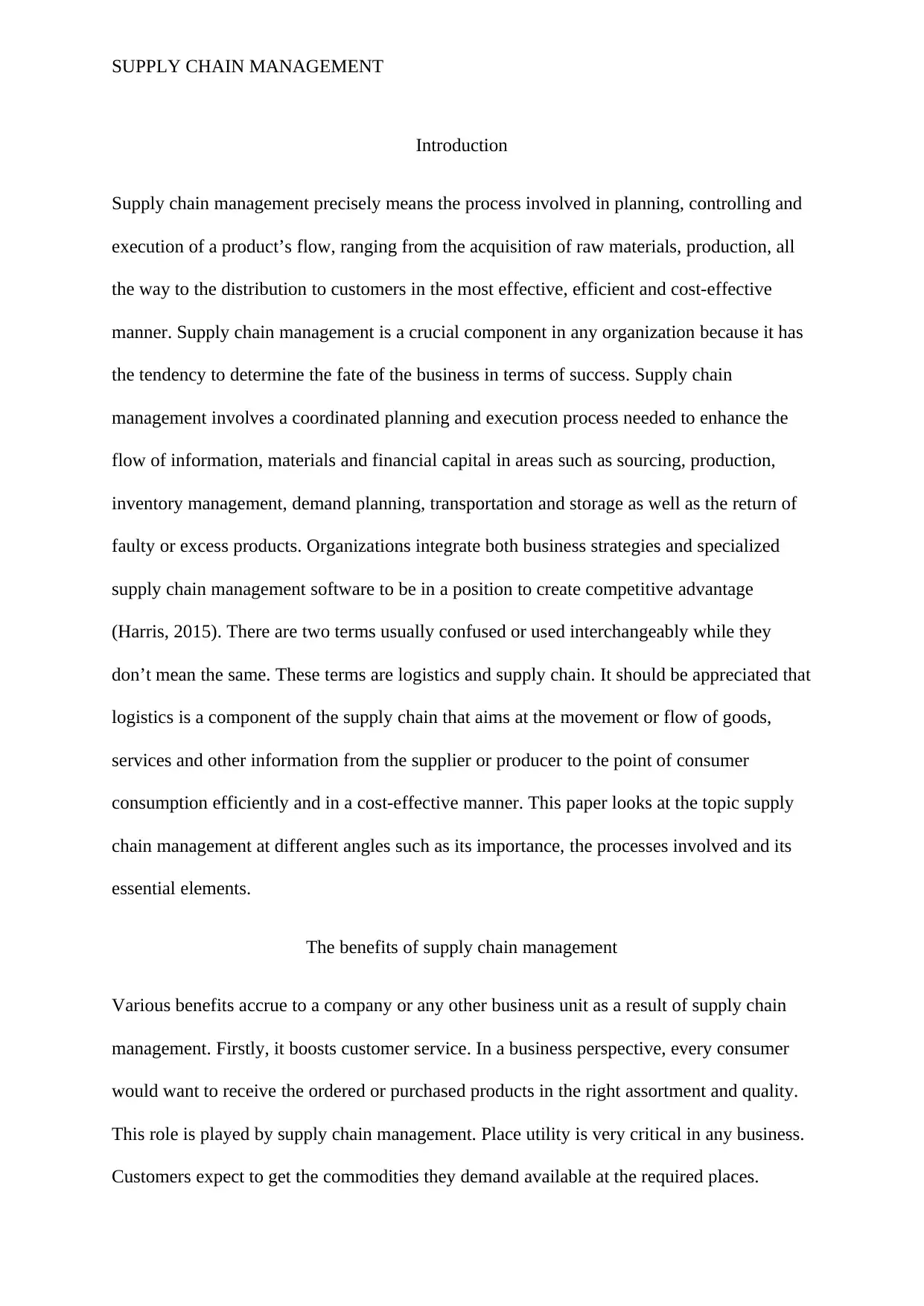
SUPPLY CHAIN MANAGEMENT
Introduction
Supply chain management precisely means the process involved in planning, controlling and
execution of a product’s flow, ranging from the acquisition of raw materials, production, all
the way to the distribution to customers in the most effective, efficient and cost-effective
manner. Supply chain management is a crucial component in any organization because it has
the tendency to determine the fate of the business in terms of success. Supply chain
management involves a coordinated planning and execution process needed to enhance the
flow of information, materials and financial capital in areas such as sourcing, production,
inventory management, demand planning, transportation and storage as well as the return of
faulty or excess products. Organizations integrate both business strategies and specialized
supply chain management software to be in a position to create competitive advantage
(Harris, 2015). There are two terms usually confused or used interchangeably while they
don’t mean the same. These terms are logistics and supply chain. It should be appreciated that
logistics is a component of the supply chain that aims at the movement or flow of goods,
services and other information from the supplier or producer to the point of consumer
consumption efficiently and in a cost-effective manner. This paper looks at the topic supply
chain management at different angles such as its importance, the processes involved and its
essential elements.
The benefits of supply chain management
Various benefits accrue to a company or any other business unit as a result of supply chain
management. Firstly, it boosts customer service. In a business perspective, every consumer
would want to receive the ordered or purchased products in the right assortment and quality.
This role is played by supply chain management. Place utility is very critical in any business.
Customers expect to get the commodities they demand available at the required places.
Introduction
Supply chain management precisely means the process involved in planning, controlling and
execution of a product’s flow, ranging from the acquisition of raw materials, production, all
the way to the distribution to customers in the most effective, efficient and cost-effective
manner. Supply chain management is a crucial component in any organization because it has
the tendency to determine the fate of the business in terms of success. Supply chain
management involves a coordinated planning and execution process needed to enhance the
flow of information, materials and financial capital in areas such as sourcing, production,
inventory management, demand planning, transportation and storage as well as the return of
faulty or excess products. Organizations integrate both business strategies and specialized
supply chain management software to be in a position to create competitive advantage
(Harris, 2015). There are two terms usually confused or used interchangeably while they
don’t mean the same. These terms are logistics and supply chain. It should be appreciated that
logistics is a component of the supply chain that aims at the movement or flow of goods,
services and other information from the supplier or producer to the point of consumer
consumption efficiently and in a cost-effective manner. This paper looks at the topic supply
chain management at different angles such as its importance, the processes involved and its
essential elements.
The benefits of supply chain management
Various benefits accrue to a company or any other business unit as a result of supply chain
management. Firstly, it boosts customer service. In a business perspective, every consumer
would want to receive the ordered or purchased products in the right assortment and quality.
This role is played by supply chain management. Place utility is very critical in any business.
Customers expect to get the commodities they demand available at the required places.
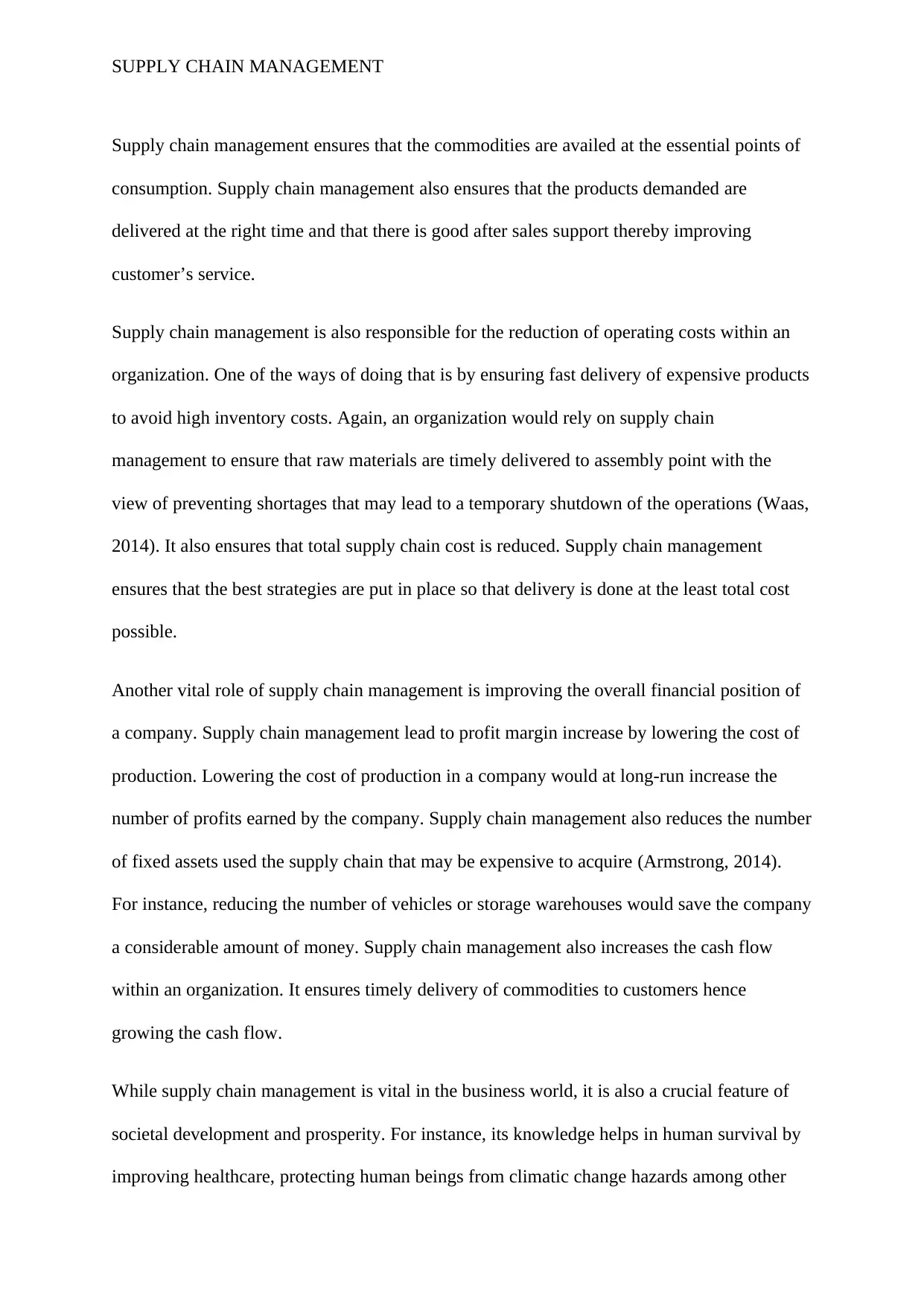
SUPPLY CHAIN MANAGEMENT
Supply chain management ensures that the commodities are availed at the essential points of
consumption. Supply chain management also ensures that the products demanded are
delivered at the right time and that there is good after sales support thereby improving
customer’s service.
Supply chain management is also responsible for the reduction of operating costs within an
organization. One of the ways of doing that is by ensuring fast delivery of expensive products
to avoid high inventory costs. Again, an organization would rely on supply chain
management to ensure that raw materials are timely delivered to assembly point with the
view of preventing shortages that may lead to a temporary shutdown of the operations (Waas,
2014). It also ensures that total supply chain cost is reduced. Supply chain management
ensures that the best strategies are put in place so that delivery is done at the least total cost
possible.
Another vital role of supply chain management is improving the overall financial position of
a company. Supply chain management lead to profit margin increase by lowering the cost of
production. Lowering the cost of production in a company would at long-run increase the
number of profits earned by the company. Supply chain management also reduces the number
of fixed assets used the supply chain that may be expensive to acquire (Armstrong, 2014).
For instance, reducing the number of vehicles or storage warehouses would save the company
a considerable amount of money. Supply chain management also increases the cash flow
within an organization. It ensures timely delivery of commodities to customers hence
growing the cash flow.
While supply chain management is vital in the business world, it is also a crucial feature of
societal development and prosperity. For instance, its knowledge helps in human survival by
improving healthcare, protecting human beings from climatic change hazards among other
Supply chain management ensures that the commodities are availed at the essential points of
consumption. Supply chain management also ensures that the products demanded are
delivered at the right time and that there is good after sales support thereby improving
customer’s service.
Supply chain management is also responsible for the reduction of operating costs within an
organization. One of the ways of doing that is by ensuring fast delivery of expensive products
to avoid high inventory costs. Again, an organization would rely on supply chain
management to ensure that raw materials are timely delivered to assembly point with the
view of preventing shortages that may lead to a temporary shutdown of the operations (Waas,
2014). It also ensures that total supply chain cost is reduced. Supply chain management
ensures that the best strategies are put in place so that delivery is done at the least total cost
possible.
Another vital role of supply chain management is improving the overall financial position of
a company. Supply chain management lead to profit margin increase by lowering the cost of
production. Lowering the cost of production in a company would at long-run increase the
number of profits earned by the company. Supply chain management also reduces the number
of fixed assets used the supply chain that may be expensive to acquire (Armstrong, 2014).
For instance, reducing the number of vehicles or storage warehouses would save the company
a considerable amount of money. Supply chain management also increases the cash flow
within an organization. It ensures timely delivery of commodities to customers hence
growing the cash flow.
While supply chain management is vital in the business world, it is also a crucial feature of
societal development and prosperity. For instance, its knowledge helps in human survival by
improving healthcare, protecting human beings from climatic change hazards among other
⊘ This is a preview!⊘
Do you want full access?
Subscribe today to unlock all pages.

Trusted by 1+ million students worldwide
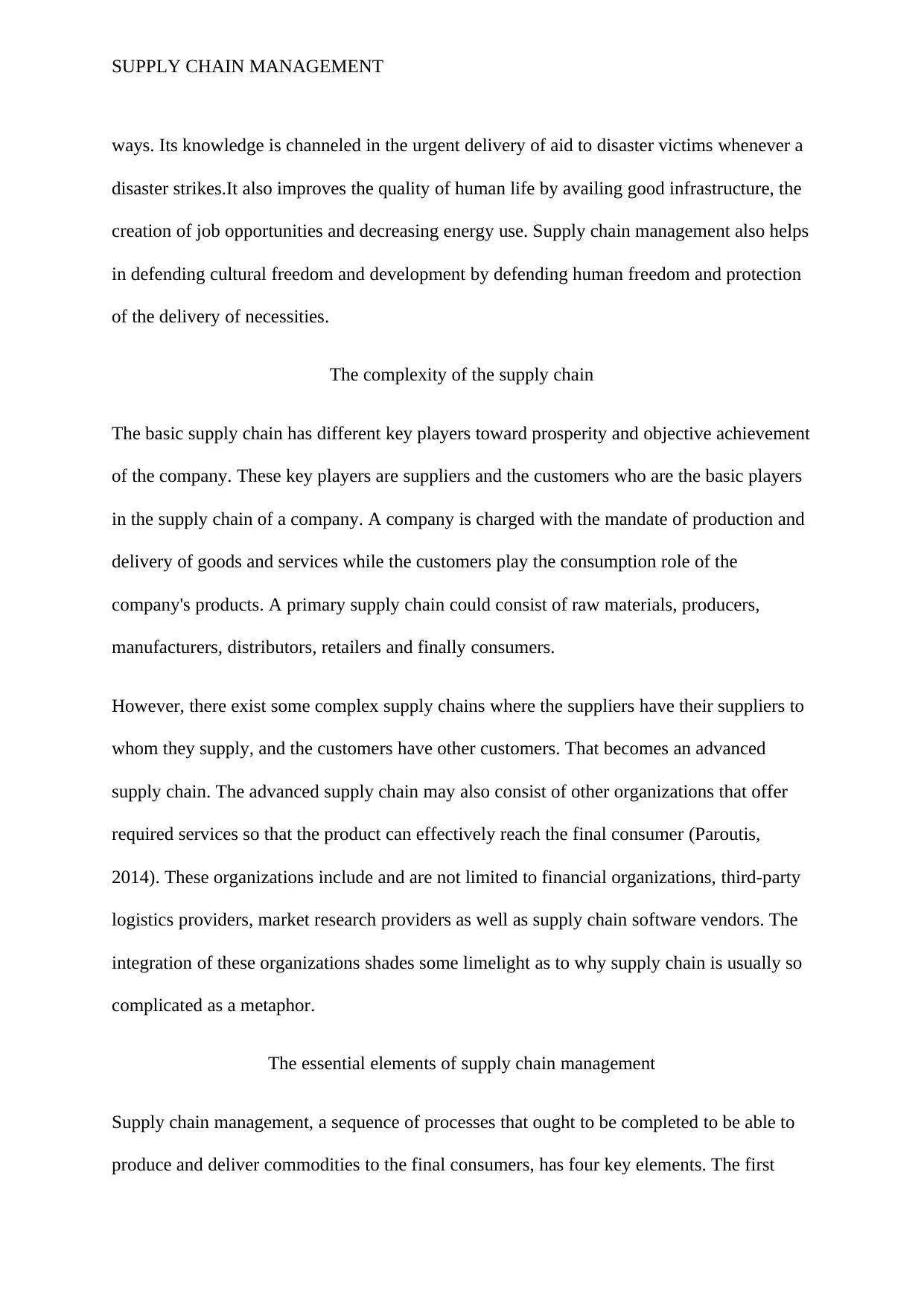
SUPPLY CHAIN MANAGEMENT
ways. Its knowledge is channeled in the urgent delivery of aid to disaster victims whenever a
disaster strikes.It also improves the quality of human life by availing good infrastructure, the
creation of job opportunities and decreasing energy use. Supply chain management also helps
in defending cultural freedom and development by defending human freedom and protection
of the delivery of necessities.
The complexity of the supply chain
The basic supply chain has different key players toward prosperity and objective achievement
of the company. These key players are suppliers and the customers who are the basic players
in the supply chain of a company. A company is charged with the mandate of production and
delivery of goods and services while the customers play the consumption role of the
company's products. A primary supply chain could consist of raw materials, producers,
manufacturers, distributors, retailers and finally consumers.
However, there exist some complex supply chains where the suppliers have their suppliers to
whom they supply, and the customers have other customers. That becomes an advanced
supply chain. The advanced supply chain may also consist of other organizations that offer
required services so that the product can effectively reach the final consumer (Paroutis,
2014). These organizations include and are not limited to financial organizations, third-party
logistics providers, market research providers as well as supply chain software vendors. The
integration of these organizations shades some limelight as to why supply chain is usually so
complicated as a metaphor.
The essential elements of supply chain management
Supply chain management, a sequence of processes that ought to be completed to be able to
produce and deliver commodities to the final consumers, has four key elements. The first
ways. Its knowledge is channeled in the urgent delivery of aid to disaster victims whenever a
disaster strikes.It also improves the quality of human life by availing good infrastructure, the
creation of job opportunities and decreasing energy use. Supply chain management also helps
in defending cultural freedom and development by defending human freedom and protection
of the delivery of necessities.
The complexity of the supply chain
The basic supply chain has different key players toward prosperity and objective achievement
of the company. These key players are suppliers and the customers who are the basic players
in the supply chain of a company. A company is charged with the mandate of production and
delivery of goods and services while the customers play the consumption role of the
company's products. A primary supply chain could consist of raw materials, producers,
manufacturers, distributors, retailers and finally consumers.
However, there exist some complex supply chains where the suppliers have their suppliers to
whom they supply, and the customers have other customers. That becomes an advanced
supply chain. The advanced supply chain may also consist of other organizations that offer
required services so that the product can effectively reach the final consumer (Paroutis,
2014). These organizations include and are not limited to financial organizations, third-party
logistics providers, market research providers as well as supply chain software vendors. The
integration of these organizations shades some limelight as to why supply chain is usually so
complicated as a metaphor.
The essential elements of supply chain management
Supply chain management, a sequence of processes that ought to be completed to be able to
produce and deliver commodities to the final consumers, has four key elements. The first
Paraphrase This Document
Need a fresh take? Get an instant paraphrase of this document with our AI Paraphraser
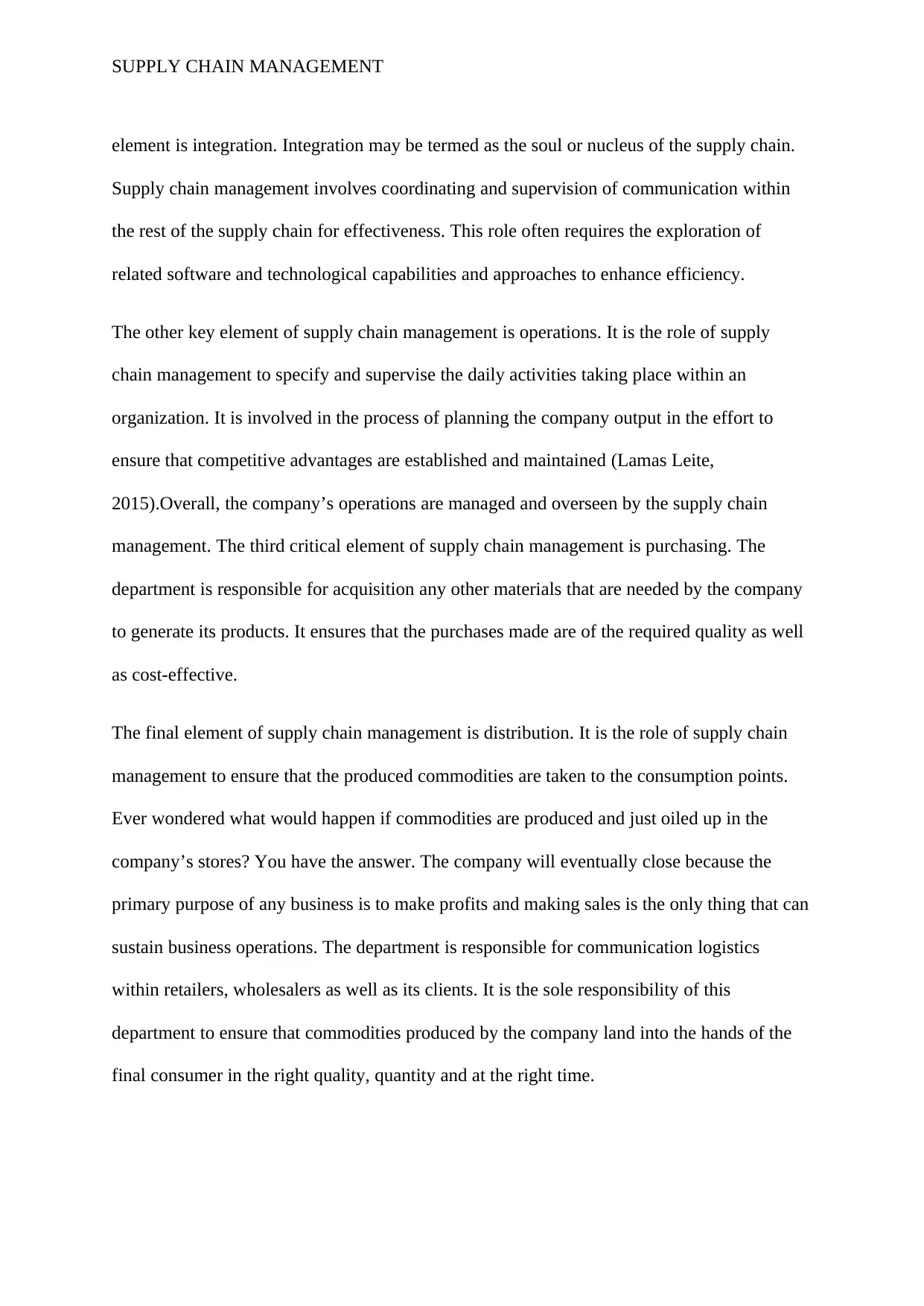
SUPPLY CHAIN MANAGEMENT
element is integration. Integration may be termed as the soul or nucleus of the supply chain.
Supply chain management involves coordinating and supervision of communication within
the rest of the supply chain for effectiveness. This role often requires the exploration of
related software and technological capabilities and approaches to enhance efficiency.
The other key element of supply chain management is operations. It is the role of supply
chain management to specify and supervise the daily activities taking place within an
organization. It is involved in the process of planning the company output in the effort to
ensure that competitive advantages are established and maintained (Lamas Leite,
2015).Overall, the company’s operations are managed and overseen by the supply chain
management. The third critical element of supply chain management is purchasing. The
department is responsible for acquisition any other materials that are needed by the company
to generate its products. It ensures that the purchases made are of the required quality as well
as cost-effective.
The final element of supply chain management is distribution. It is the role of supply chain
management to ensure that the produced commodities are taken to the consumption points.
Ever wondered what would happen if commodities are produced and just oiled up in the
company’s stores? You have the answer. The company will eventually close because the
primary purpose of any business is to make profits and making sales is the only thing that can
sustain business operations. The department is responsible for communication logistics
within retailers, wholesalers as well as its clients. It is the sole responsibility of this
department to ensure that commodities produced by the company land into the hands of the
final consumer in the right quality, quantity and at the right time.
element is integration. Integration may be termed as the soul or nucleus of the supply chain.
Supply chain management involves coordinating and supervision of communication within
the rest of the supply chain for effectiveness. This role often requires the exploration of
related software and technological capabilities and approaches to enhance efficiency.
The other key element of supply chain management is operations. It is the role of supply
chain management to specify and supervise the daily activities taking place within an
organization. It is involved in the process of planning the company output in the effort to
ensure that competitive advantages are established and maintained (Lamas Leite,
2015).Overall, the company’s operations are managed and overseen by the supply chain
management. The third critical element of supply chain management is purchasing. The
department is responsible for acquisition any other materials that are needed by the company
to generate its products. It ensures that the purchases made are of the required quality as well
as cost-effective.
The final element of supply chain management is distribution. It is the role of supply chain
management to ensure that the produced commodities are taken to the consumption points.
Ever wondered what would happen if commodities are produced and just oiled up in the
company’s stores? You have the answer. The company will eventually close because the
primary purpose of any business is to make profits and making sales is the only thing that can
sustain business operations. The department is responsible for communication logistics
within retailers, wholesalers as well as its clients. It is the sole responsibility of this
department to ensure that commodities produced by the company land into the hands of the
final consumer in the right quality, quantity and at the right time.
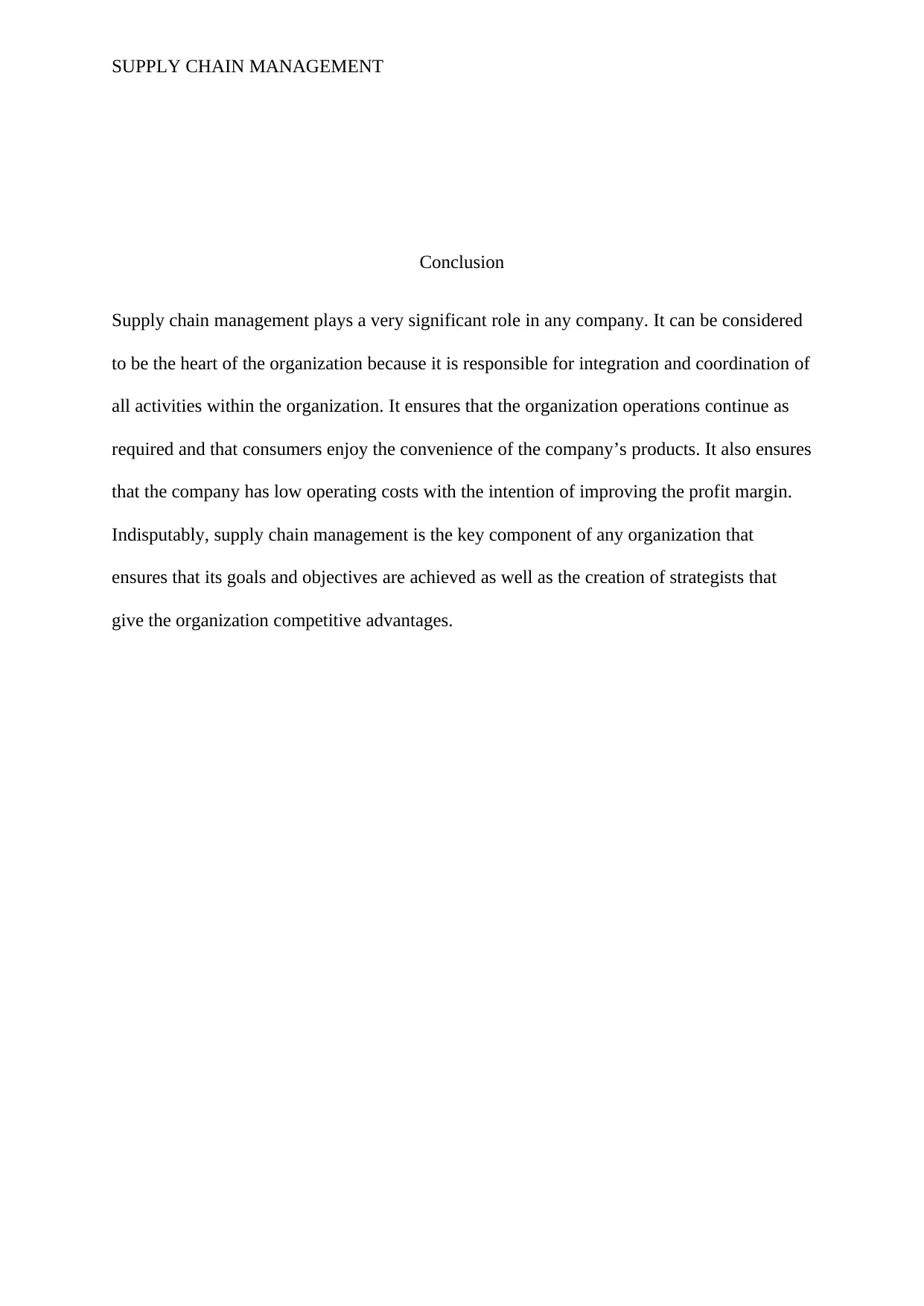
SUPPLY CHAIN MANAGEMENT
Conclusion
Supply chain management plays a very significant role in any company. It can be considered
to be the heart of the organization because it is responsible for integration and coordination of
all activities within the organization. It ensures that the organization operations continue as
required and that consumers enjoy the convenience of the company’s products. It also ensures
that the company has low operating costs with the intention of improving the profit margin.
Indisputably, supply chain management is the key component of any organization that
ensures that its goals and objectives are achieved as well as the creation of strategists that
give the organization competitive advantages.
Conclusion
Supply chain management plays a very significant role in any company. It can be considered
to be the heart of the organization because it is responsible for integration and coordination of
all activities within the organization. It ensures that the organization operations continue as
required and that consumers enjoy the convenience of the company’s products. It also ensures
that the company has low operating costs with the intention of improving the profit margin.
Indisputably, supply chain management is the key component of any organization that
ensures that its goals and objectives are achieved as well as the creation of strategists that
give the organization competitive advantages.
⊘ This is a preview!⊘
Do you want full access?
Subscribe today to unlock all pages.

Trusted by 1+ million students worldwide
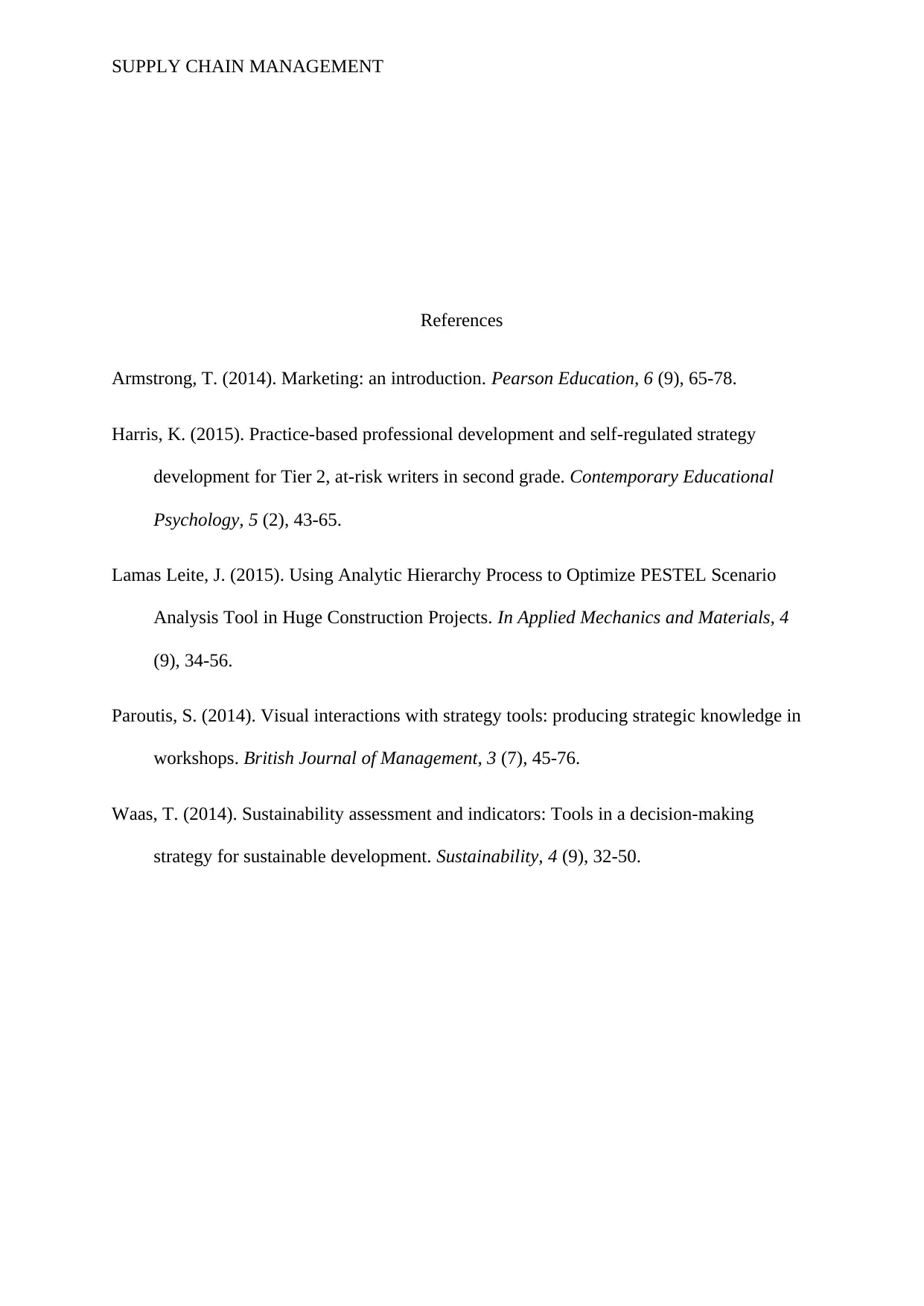
SUPPLY CHAIN MANAGEMENT
References
Armstrong, T. (2014). Marketing: an introduction. Pearson Education, 6 (9), 65-78.
Harris, K. (2015). Practice-based professional development and self-regulated strategy
development for Tier 2, at-risk writers in second grade. Contemporary Educational
Psychology, 5 (2), 43-65.
Lamas Leite, J. (2015). Using Analytic Hierarchy Process to Optimize PESTEL Scenario
Analysis Tool in Huge Construction Projects. In Applied Mechanics and Materials, 4
(9), 34-56.
Paroutis, S. (2014). Visual interactions with strategy tools: producing strategic knowledge in
workshops. British Journal of Management, 3 (7), 45-76.
Waas, T. (2014). Sustainability assessment and indicators: Tools in a decision-making
strategy for sustainable development. Sustainability, 4 (9), 32-50.
References
Armstrong, T. (2014). Marketing: an introduction. Pearson Education, 6 (9), 65-78.
Harris, K. (2015). Practice-based professional development and self-regulated strategy
development for Tier 2, at-risk writers in second grade. Contemporary Educational
Psychology, 5 (2), 43-65.
Lamas Leite, J. (2015). Using Analytic Hierarchy Process to Optimize PESTEL Scenario
Analysis Tool in Huge Construction Projects. In Applied Mechanics and Materials, 4
(9), 34-56.
Paroutis, S. (2014). Visual interactions with strategy tools: producing strategic knowledge in
workshops. British Journal of Management, 3 (7), 45-76.
Waas, T. (2014). Sustainability assessment and indicators: Tools in a decision-making
strategy for sustainable development. Sustainability, 4 (9), 32-50.
1 out of 7
Related Documents
Your All-in-One AI-Powered Toolkit for Academic Success.
+13062052269
info@desklib.com
Available 24*7 on WhatsApp / Email
![[object Object]](/_next/static/media/star-bottom.7253800d.svg)
Unlock your academic potential
Copyright © 2020–2026 A2Z Services. All Rights Reserved. Developed and managed by ZUCOL.




